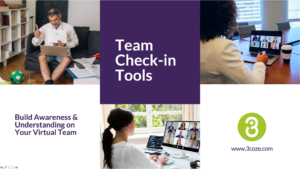There’s something missing when your team is separated from one another—something intangible. It’s that sense of where people are at, of how they’re doing. Sure, you don’t ever really know what’s going on inside someone’s head, even if you’re sitting six inches away from them in your open office, but at least you get clues from observing their body language, overhearing their conversations, and engaging in casual chit-chat throughout the day.
It turns out that this information is really important. Researchers call it “mutual knowledge” (because if there’s one thing academics are good at, it’s taking an important concept about human connection and giving it a name that’s drier than toast. But I digress.) Mutual knowledge is found in these small details that we know about one another. It’s important because it provides context for other people’s behavior and helps us to interpret our teammates’ actions (as good/bad, helpful/unhelpful, threatening/non-threatening).
When we’re physically separated from one another, we lose a lot of mutual knowledge. It might be as simple as forgetting that it’s 4 am for one of your colleagues and therefore they might not be as perky as normal or as everyone else. But it can be much more profound, such as failing to appreciate a teammate’s unruly workload, their personal pressures, or their physical or mental health.
Why Mutual Knowledge is Important
As I said, having contextual information helps you understand and interpret your teammate’s behavior. The more you understand about their situation, the better you’ll be able to, for example:
- manage your requests of them to ensure you get what you need
- decode the meaning and intent of their communications to reduce misinterpretations and back-and-forth (not to mention unproductive conflict)
- interpret what it means when they’re silent and know whether it’s a good sign or a bad one
- anticipate how they’ll react to issues so you can position your communications more effectively
Without mutual knowledge, you’re more likely to make requests others can’t fulfill, to misinterpret someone’s comments, and to be surprised by their reactions. The result might be frustration, contempt, or resentment; all negative and even toxic emotions that slow down your productivity and add to your stress levels. These unsavory outcomes can be avoided by having more appropriate expectations based on better awareness.
Get to Know Your Teammates
As always, I am committed to putting my time where my mouth is. I have created (or adapted) a set of nine exercises that you can use to increase mutual knowledge on your team. Feel free to download the pack (which includes both instructions for you and slides to use with your team). I’m really proud of these and I hope that you find them useful.
(Click the image to download.)
Here’s a taste of some of the exercises, which fall into three categories:
Get to Know One Another
The basic form of mutual knowledge is information about the person and their environment. Try using one of these check-in exercises to help your team get to know one another better.
Today’s the Day. This quick and fun exercise encourages team members to share something special about today and to talk about how they’re celebrating. Anything is fair game. Try the National Day calendar (March 15th is National Nap day…and I am definitely going to celebrate that!). Share something important from your country, city, religion, or culture. Share a personal story about what makes the day important.
The (re)Name Game. Use the functionality of your video meeting tool to ask team members to change the way their name is displayed to include all sorts of fun descriptors. I’ve included ideas for new teams, geographically diverse teams, and long-term teams who want to learn something new.
Forge a Stronger Connection
The Struggle is Real. One of the major gaps in virtual teams is that we don’t know when our colleagues are struggling. This check-in exercise has each member of the team ask for one form of assistance, whether they need an ovation, inspiration, validation, or resuscitation. You could use this for the whole team every once in a while, or rotate one or two people asking for help each time you meet.
Us and Them. I talked about this exercise in my book, The Good Fight, and now I’ve finally created the slides to support it. This exercise is great for helping your team reframe harmful us versus them divides, not by trying to reverse the natural human tendency to form in- and out-groups, but by helping people see that there are infinite ways to think about us and them and that everyone on the team falls in your in-group on one dimension or another.
Set Up Difficult Discussions for Success
What Matters Most. It’s hard to communicate well over video. What gets lost is not the simple facts and information, but the tone and body language that helps us gauge emotions and infer the values and beliefs underlying people’s perspectives. Use this check-in before contentious discussions to help people articulate the values that will be shaping their contributions.
I am so excited to share these tools with you. They are part of my commitment to make the ideas here more digestible, more applicable, and more sharable. Give them a try and let me know what you think. Feedback is incredibly helpful. How does having more mutual knowledge change your team dynamics?
WARNING, shameless promotion!! Mutual Knowledge and the Check-in toolkit are only a tiny part of our new training program on Working Remotely. If it’s time to support your remote workforce or your remote managers, I’m happy to share more details of the program with you. Just email me.
Further Reading
Team Building Exercise: Pass the Problem
Exercise: Nail Your Introduction


Thanks Liane! These are fantastic and looking forward to test driving them!!!!
Thanks, Jen. Please let me know how it goes!
Thank you Liane, your posts are always timely!
Thanks Anne, nothing makes me happier than when I hit the right topic for the moment!
How timely and generous of you, Liane! We just spent a whole year teleworking and it has not always been easy. Thank you very much for these resources, and for “walking the talk” and making the ideas you share on this platform “more digestible, more applicable, and more sharable”. I’ve shared the link with a few colleagues in my organization working on improving team dynamics and collaboration, and I’m sharing further tomorrow! Thanks again!
Raïmi, I’m so glad that you found the check-in exercises useful. And please, share away! The more people we can reach, the more we’ll set up virtual teams for success. It’s not enough to just communicate with our teammates, we need to actually connect with them. Trust is so critical to productivity and positivity!
What timely and great resources- Thank you so much for sharing your knowledge.
Hi Lisa, I’m so glad you can put them to good use!